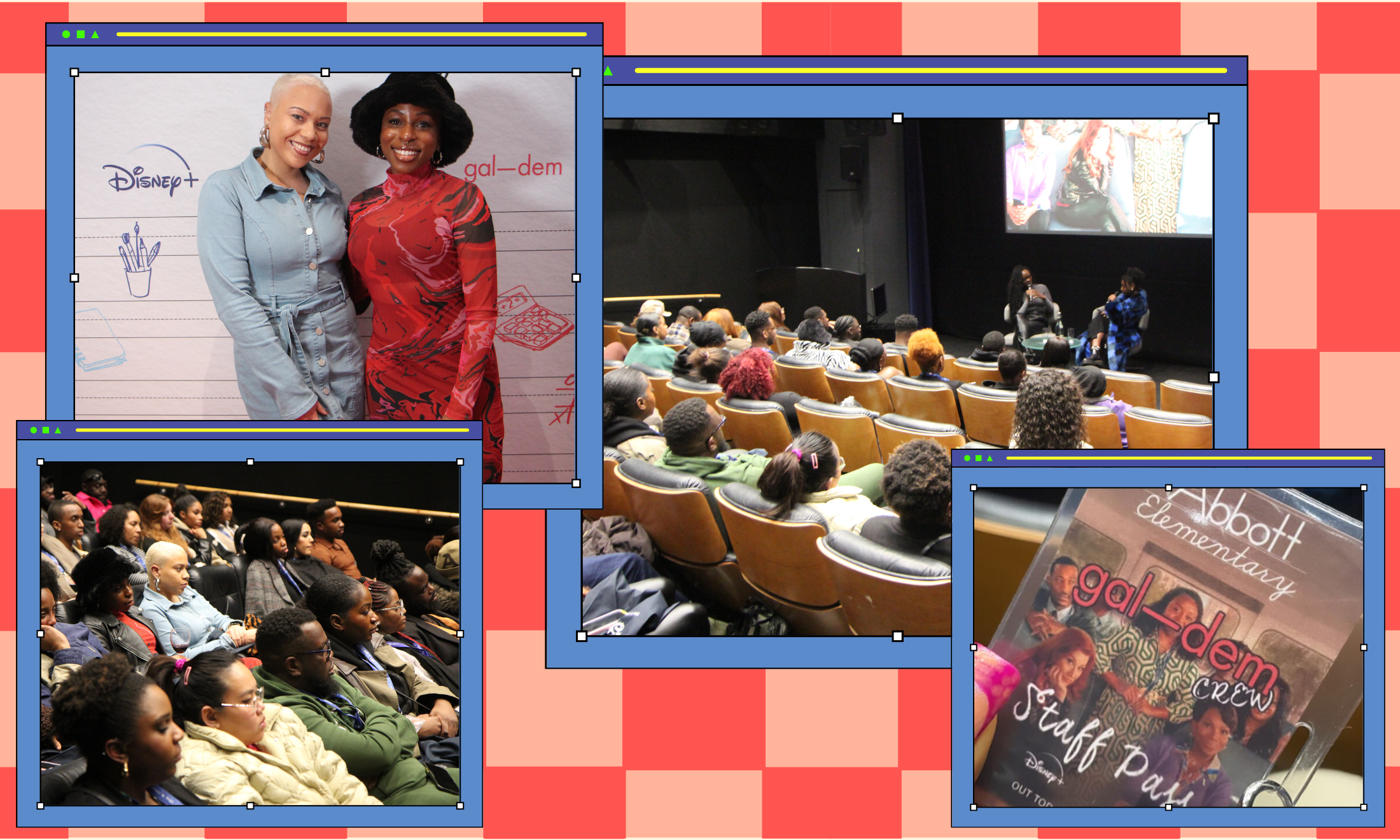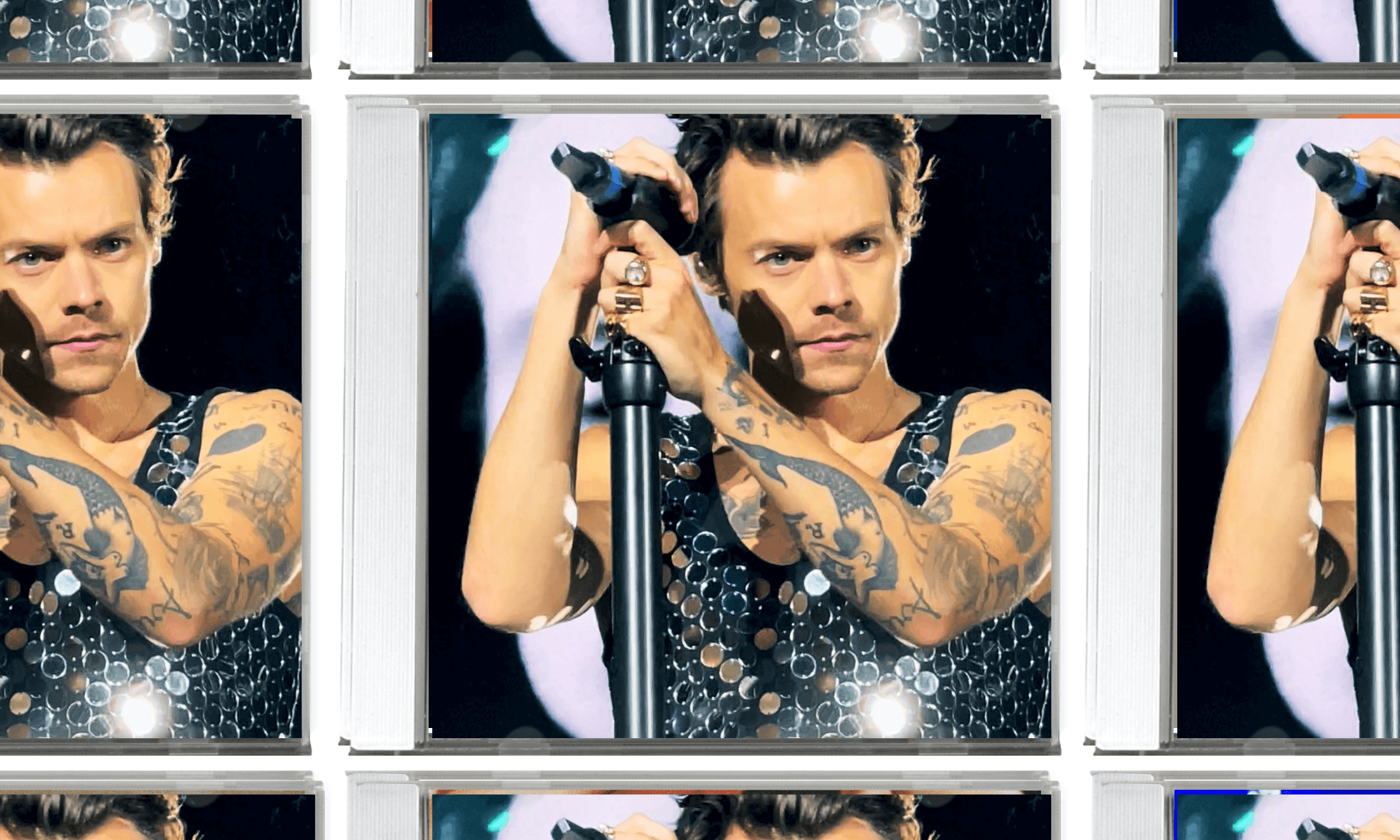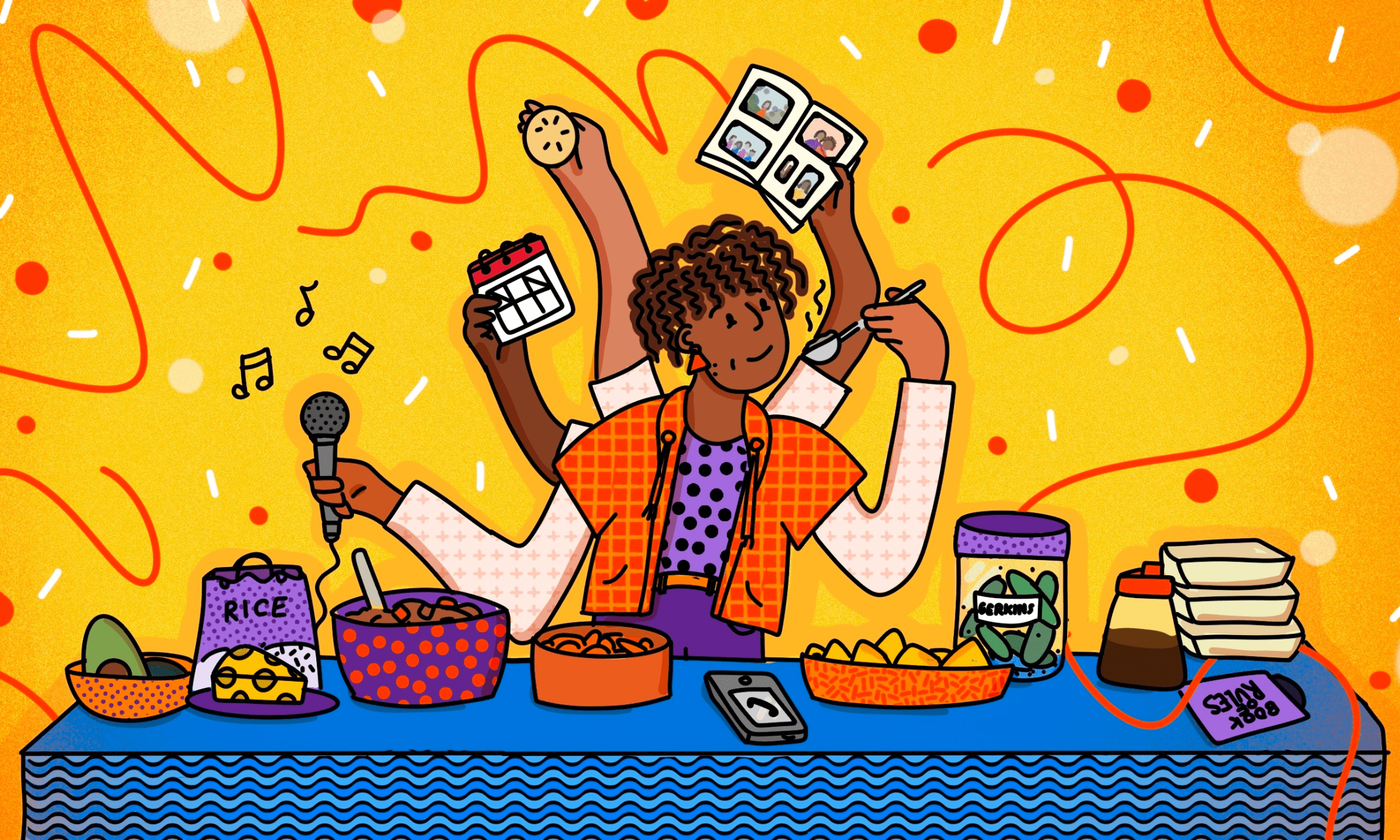
The High Table celebrates black queer love and Nigerian ancestry on stage
gal-dem meets writer Temi Wilkey and actor Jumoké Fashola, starring in the new play The High Table.
Niellah Arboine
17 Feb 2020
Photography by Helen Murray
I remember quite vividly being asked by Temi Wilkey, an actor, writer and co-founder of the wonderful drag king collective Pecs, to come along to a script reading early in 2019. It was for a play about ancestors, black queer love and Nigerian heritage. I also recall kicking myself for not being able to make it to the script reading. Now, a year later, Temi’s debut play, The High Table, has come to life and found a home at Bush Theatre in Shepherds Bush. And I can safely say, this is one of the most powerful pieces of new work I’ve seen. I left with a lot more than I expected.
Before the play opens, I meet up with Temi and Jumoké Fashola, an actor, singer and host on BBC Radio 3 (who plays characters Mosun and Yetunde), in a small room at the top of an unforgiving set of staircases in the theatre. Temi’s sat on a low rocking-chair, Jumoké on a bench. I’m sat on the least precarious seating of the three available. “We’re hyper right now because it’s so intense!” Jumoké says, and the two burst into laughter. “It’s just crunch time you know?” Temi replies. They’re nervous, brimming over with unfiltered excitement and riffing off of each other’s sentences. With just a few weeks to go before opening night, it’s completely understandable.
The High Table, directed by Daniel Bailey, takes us on a journey into the intricacies of love and ancestry, mixing in Temi’s own experiences to tell a story that feels like a true first for British theatre right now. Hilariously heartwarming and bitterly crushing, it shows the private moments of interpersonal relationships in an intimate and delicate way. Tara (Cherelle Skeete), is set to marry Leah (Ibinabo Jack) but Tara hasn’t quite been open with her Yoruba family about their relationship. So when Tara announces their wedding, it’s met with disapproval and disbelief from her parents, with her mother even wailing: “You said you were a bisexual!” As this happens down on earth, we enter a parallel realm where we meet Tara’s ancestors, who have been summoned to bless the wedding, but until there is a majority vote – it can’t be approved.
“It’s black queer legacy – we are here, we exist”
Temi Wilkey
And this is where dual characters are smartly utilised. It’s both an artistic and practical decision, Temi notes. Ibinabo Jack plays both Leah and Adebisi, one of the newest and least approving ancestors. David Webber, who also performed in The Barbershop Chronicles, is both Leah’s father Segun and the ancestor Babatunde. Jumoké takes on Tara’s mother as well as the eldest of the ancestors, Mosun. “Mosun is the character most against the marriage, whereas Yetunde is the ancestor arguing the most to bless it, so it’s interesting to see people really swap sides on the argument,” Temi says, noting she’d most likely play Yetunde if there was a revival in 30 years.
These dual characters worked perfectly in The High Table. I spent the vast majority of Yetunde’s final monologue, which explained how she came to the afterlife, in heavy hiccupy tears, both shocked and embarrassed about how much I could possibly cry. She felt worlds away from Mosun, who was at times callous – a true testament to Jumoké’s acting.
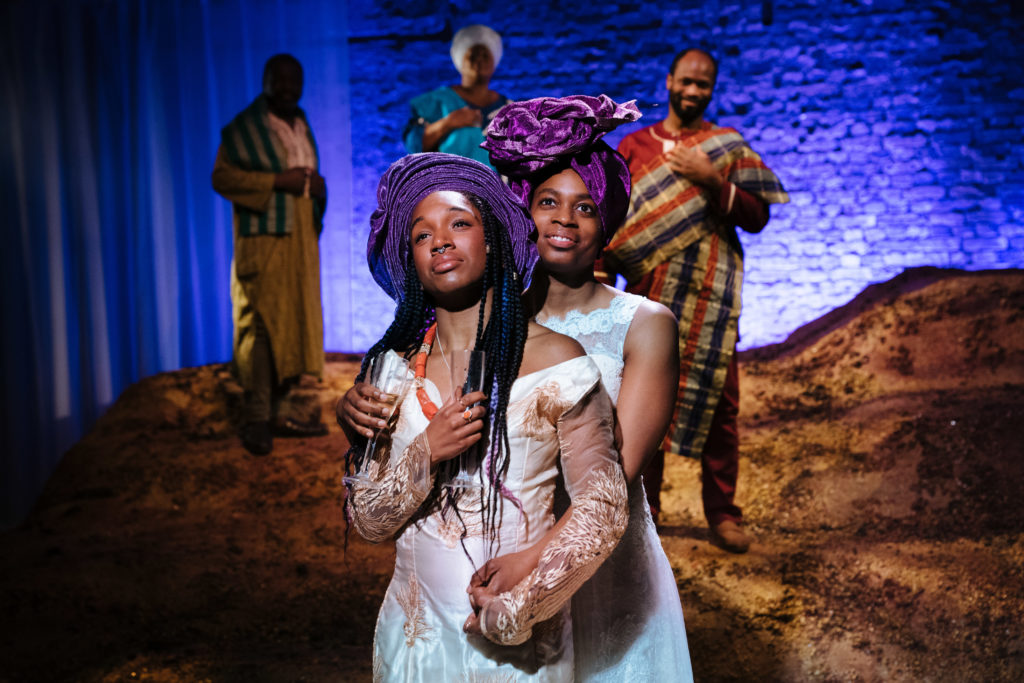
Photography by Helen Murray
At its core, this play really holds a mirror up to the hefty weight of colonisation, and how it has damaged something as pure as who we love. As someone who also hails from a country riddled with homophobic colonial residue (Jamaica), this one really hit. From ancestors aeons back encountering the first missionaries, down to Tara’s parents refusal to accept her marriage because of their Christian beliefs – it’s all connected.
And for Temi, this is personal. “The laws in my country of origin would put me in jail. That’s real talk … you literally live in danger, in fear,” she says. It’s a narrative we see played out through the character Teju (played by Stefan Adegbola) who is being blackmailed by the police after attending a gay bar. In Nigeria, the Same Sex Marriage Prohibition Act came into action in 2014. Undoubtedly this law, and others like it, are residue from colonialism. “Even if maybe people who live in Nigeria never see this play, it still felt an important thing to do as someone of Nigerian heritage,” explains Temi. “It just feels like it’s a love story [set against] the backdrop of quite a homophobic family and that is due to cultural issues that were imported from this country. So it’s a full circle”.
“I feel a privilege to do this play, I honestly do, but I also feel the pressure of wanting to get it right”
Jumoké Fashola
First play nerves undoubtedly must be terrifying. Temi tells me about feeling apprehensive due to the weight of having multiple communities to respect and protect. “You feel like you have a duty to the black community, specifically the Nigerian, African community. But then also there’s homophobia in the community, and that has to be talked about and explored,” she muses. “But then there’s so rarely representation of queer women on stage that you feel a pressure from the queer community because you want to serve them as best you can but also you can’t represent everything.” The preciousness of The High Table is something Jumoké understands well, “I feel a privilege to do this play, I honestly do, but I also feel the pressure of wanting to get it right.”
For me, a standout moment which I feel captured the multifaceted nature of blackness, was one with Leah. As a lifelong member of black-folks-who-don’t-know-the-Candy-dance support group, always finding myself popping off to the toilet or pretending to be on my phone at the function, I’ve honestly never felt more validated by Leah’s mirrored lack of know-how. Temi continued to show that we aren’t a monolith (although, now I feel shamed into finally learning it). And it was nice to see some representation for black people who don’t hail from London, through her character.
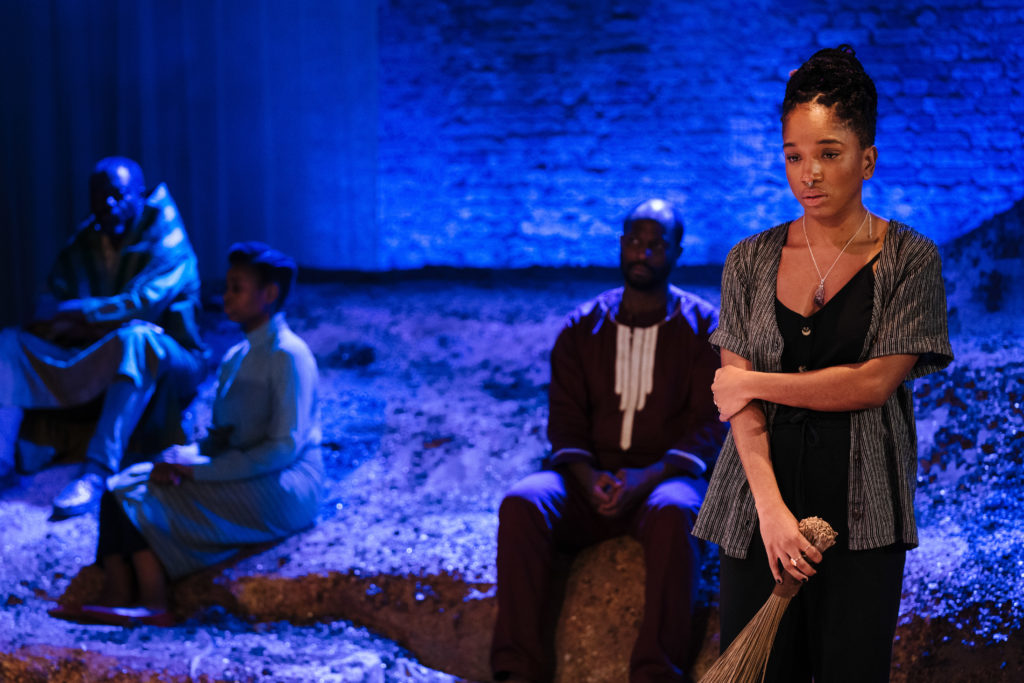
Photography by Helen Murray
Perhaps due to their close proximity to the work, general humbleness or first play nerves, the magic of The High Table was almost underplayed to me by its creators. I was truly transported far away from the Bush theatre, into realms my mind could barely comprehend, floating away with my ancestors and my thoughts. It also told a story rarely witnessed on stage. “Where have you seen it before? Tell me?” Temi asks, and she’s right. A play focusing on two black British women in love isn’t one I can pull from my mind. “Not just in the lickle side character black girl, best friend has a girlfriend, that’s interesting cool. No. This is their story, you don’t see it anywhere else”.
I left the room feeling nourished, and a bit lost for words. I was happy to be amongst a room full of my peers and people I look up to in the theatre world as we chowed down on moin moin, jollof rice and puff puff (honestly more food than I’ve ever got at a press night before, may I say). But more than anything, The High Table is about legacy. “You can’t forget our tradition, the black tradition is an oral tradition. We pass things on,” Jumoké says. Sadly, these same traditions and “hyper-documentation” from Western cultures as Temi puts it, are the reason why pre-colonial same-sex relationships aren’t remembered.
“It can feel like everything’s just floating through your hands, like there’s nothing solid, but this will be a book, people can pick it up and read it,” Jumoké says. The High Table will live in the canon of black British theatre. And Temi puts it best. “It’s black queer legacy – we are here, we exist.”


